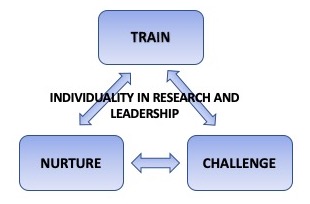About the programme
The postdoc to research LEADer programme (LEAD) recruited three cohorts of international postdoctoral fellows to the Biotech Research and Innovation Centre (BRIC), University of Copenhagen (UCPH).
The programme is co-funded by the European Union’s Horizon 2020 Research and Innovation Programme under the Marie Skłodowska-Curie grant agreement no. 945322.
Participating in the LEAD programme provides tools and insight to identify and overcome the obstacles for pursuing a career as a research leader in either academia or industry/biotech.
LEAD offers an outstanding framework to conduct top interdisciplinary biomedical research that can advance your research fields, but at the same time support, nurture and challenge you to develop excellent research leadership competences and transferable skills, and to support strategic career development.
LEAD aims to empower diverse research talent to become the next generation of creative, collaborative, responsible and inclusive research leaders.
We will support them to deconvolute their personal way into research leadership and supply them with an ambitious and talented peer and collegial network.
Three approaches will be taken to support fellow development: to train (provide tools for acquisition of skills), nurture (support and guide fellows to find their individual way) and challenge (push fellows to dare and to grow through accomplishment).

BRIC is a Centre of Excellence initiated in 2003 by the Danish Ministry of Science, Technology and Innovation. BRIC has around 200 employees and 21 independent research groups.
BRIC’s overall strategic mission is to perform cutting-edge disease-oriented biomedical research within cancer, metabolic and neurological diseases. The centre is internationally recognised as a leading player in a variety of disciplines including epigenetics, chromatin biology, RNA biology, stem cell research, cancer biology, invasion and metastases, neuro-degenerative diseases and bioinformatics.
The centre is localised in modern laboratories with state-of-the-art facilities, including eight core facilities open to all BRIC researchers, including expertise training in use and analysis of data offered by dedicated staff scientists.
Further, BRIC researchers have extended access to facilities at the Faculty of Health and Medical Sciences and through our membership in the EU-life alliance.
BRIC also offer extensive support for the centre’s researchers including laboratory service (daily maintenance, repairs, central ordering, handling of laboratory safety issues etc), pre-award grant support, science communication and outreach programme, support for organisation of courses and scientific meetings, dedicated PhD and postdoc training and career development programmes.
12 partner organisations and international experts are involved in all programme phases
- Development: Novo Nordisk A/S.
- Transferable skills training and career activities: Novo Nordisk, Gubra, Nordic Bioscience, Bioneer and the EU-LIFE alliance.
- Researcher selection and programme governance: Novo Nordisk, Nordic Bioscience, the PhD Career Consultancy (SME), the Max Planck Institute, the European Molecular Biology Laboratory, The Netherlands Cancer Institute.
- Dissemination of calls and project results: the European Network for Postdoctoral Associations (ENPA), the Medicon Valley Alliance (MVA) and EU-LIFE.
Committees
The PCC will be responsible for the implementation of LEAD, with a special focus on the scientific and training content.
In regards of the selection process, the PCC will have a coordination role putting together the Scientific Review Panel (SRP) and ranking the candidates based on the SRP’s and Selection Committees scores.
The PCC will consist of:
- Professor Anders Lund, Program coordinator
- Agnieszka Krzyzanowska, Program manager
- Assoc. professor, Luis Arnes, head of BRIC's postdoc program
- Professor Janine Erler
Scientific review panels consisting of international independent scientific reviewers covering the scientific scope within LEAD will be assembled for each call.
Each BRIC PI will suggest up to four experts in their field to the LEAD Programme Coordination Committee, excluding close collaborators with shared publications.
The PCC will from the suggestions put together a review panel with three independent experts, who will review applicants within a given area. Each evaluator will maximum evaluate 6 applicants.
The evaluators in a panel will individually score the applicants using the predefined criteria and scoring system and assess their main strength and weaknesses. Their evaluations are submitted to the programme manager.
The Selection Committee (SC) will perform on-site oral interviews of the shortlisted candidates and will evaluate the applicants using predefined evaluation criteria and scoring system.
The SC consists of:
- Professor Martin Jechlinger, EMBL, Heidelberg
- Professor and Director Anne Grapin-Botton, Max Planck Institute of Molecular Cell Biology and Genetics, Dresden
- Daniel Timmermann, Head of global drug discovery innovation, Novo Nordisk A/S
- Nordic Bioscience
- Four appointed non-recruiting BRIC group leaders
The Advisory Board will advise LEAD’s coordinator and PCC on selection processes, training portfolio and career development activities to ensure excellence in all project phases.
The AB consists of four international, intersectoral experts:
- Professor and postdoc dean at Netherlands Cancer Institute Fred van Leeuwen
- Daniel Timmermann, Head of global drug discovery innovation, Novo Nordisk A/S
- Sarah Blackford, career consultant, Bioscience Careers
- Marina Cacace, social scientist, Knowledge and Innovation institute
The AB will meet with PCC at kick-off and as a minimum twice during the programme (physical and Skype).
Also, they will together with the coordinator and PCC evaluate LEAD at the end of the programme, giving recommendations on long-term sustainability and future adaptations.
Prof. Nils Billestrup, former head of the Graduate School at the Faculty of Health and Medical Sciences and current acting ‘named person’, will support the fellows during implementation of the program.
The Faculty of Health and Medical Sciences and the Faculty of Science, UCPH has an ethical committee (Research Ethics Committee of Science and Health), with strong ethical expertise with specific knowledge of ethics in EU projects.
Prof. Lisbeth E. Knudsen chairs the committee and has in that role acted as ethical advisor for UCPH’s DP COFUND projects and will do so also for LEAD.
